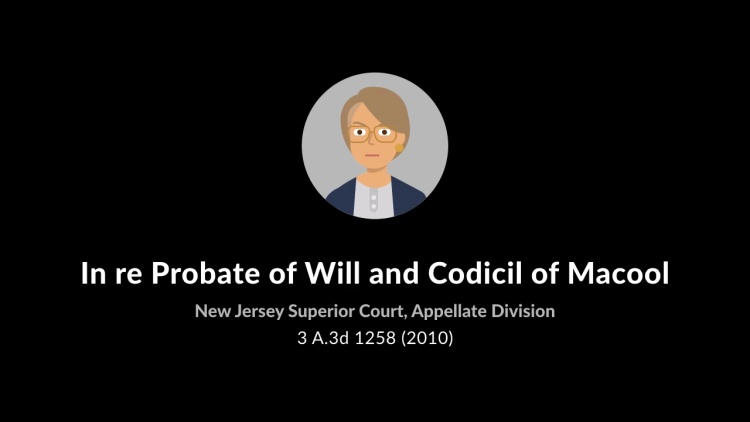In re Probate of Will and Codicil of Macool
New Jersey Superior Court, Appellate Division
3 A.3d 1258 (2010)

- Written by Sara Rhee, JD
Facts
Louise Macool executed a will on September 13, 1995 through her attorney Kenneth Calloway. The will named her husband as the sole beneficiary and his children, grandchildren, and great-grandchildren as contingent beneficiaries. Macool executed a codicil on May 23, 2007. Louise’s husband passed away on April 26, 2008. On May 21, 2008, Macool visited Calloway’s office to change her will. She brought a handwritten note that, among other things, reflected her wish to add as a beneficiary Mary Rescigno (plaintiff), her niece, and that her home be left in the Macool family. Rescigno’s daughter and grandchildren were named as contingent beneficiaries of her share. After Macool left Calloway’s office, Calloway prepared a draft will based on their conversation. The draft was substantially similar to Macool’s handwritten notes but did not name her grandchildren as residual beneficiaries. Moreover, the draft will stated that the Macool children were to try to keep the home in the Macool family as long as possible. Calloway expected that Macool would return to review the draft. However, Macool passed away soon after leaving his office. Macool’s 1995 will and 2007 codicil were admitted to probate. Rescigno brought this action to invalidate the 1995 will and 2007 codicil, and have the draft will admitted to probate. The trial court found that there was insufficient evidence that Macool intended the draft will to be her final testament and ruled that it could not be admitted to probate.
Rule of Law
Issue
Holding and Reasoning (Fuentes, J.)
What to do next…
Here's why 907,000 law students have relied on our case briefs:
- Written by law professors and practitioners, not other law students. 47,100 briefs, keyed to 996 casebooks. Top-notch customer support.
- The right amount of information, includes the facts, issues, rule of law, holding and reasoning, and any concurrences and dissents.
- Access in your classes, works on your mobile and tablet. Massive library of related video lessons and high quality multiple-choice questions.
- Easy to use, uniform format for every case brief. Written in plain English, not in legalese. Our briefs summarize and simplify; they don’t just repeat the court’s language.





